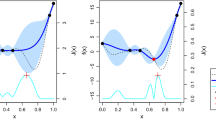Abstract
This study proposes a novel best-first search algorithm, called Valuation Increment Search Algorithm (VIS), which applies the increment of exploratory value change to predict the valuation and guide the selection of the game tree. The proposed method can effectively use node valuation and game tree size information to solve the game tree by fewer exploration steps. The relevant assumptions and search principles of the proposed algorithm are detailed. Moreover, comparative experiments with Alpha–Beta Search (α–β search), Proof-Number Search (PNS) and Monte-Carlo Tree Search (MCTS) in the domain of Dou Dizhu has been performed to verify the performance. Result demonstrate that VIS is superior to α–β search, PNS and MCTS algorithm in solving the game tree and finding the best move for some game scenarios by consuming less time and few memory resources. The improvement effect of the average Increment, magnitude of Increment, and the number of visits to node on the original VIS was validated. Also, a new selection strategy is defined for the improved VIS algorithm combined with these factors. The experimental comparison results show that improved VIS has a better performance in solving game tree with less nodes generated and expanded than original VIS.









Similar content being viewed by others
References
Abderazek H, Yildiz AR, Mirjalili S (2020) Comparison of recent optimization algorithms for design optimization of a cam-follower mechanism. Knowl Based Syst 191:105237–105237
Allis LV, van der Meulen M, Van Den Herik HJ (1994) Proof-number search. Artif Intell 66:91–124
Berliner HJ, McConnell C (1996) B∗ probability based search. Artif Intell 86:97–156
Breuker DM, Uiterwijk JWHM, Herik HJ (1999) The PN2-search algorithm. Universiteit Maastricht, Department of Computer Science, Netherlands.
Browne CB et al (2012) A survey of Monte–Carlo tree search methods. IEEE Trans Comput Intell AI Games 4:1–43
Chaslot G, Bakkes S, Szita I, Spronck P (2008) Monte–Carlo tree search: a new framework for game AI. Fourth Artificial Intelligence and Interactive Digital Entertainment Conference, pp 216–217
Companez N, Aleti A (2016) Can Monte–Carlo tree search learn to sacrifice? J Heuristics 22:783–813. https://doi.org/10.1007/s10732-016-9320-y
Coulom R (2006) Efficient selectivity and backup operators in Monte-Carlo tree search. In: International conference on computers and games, Springer, pp 72–83
Di Palma S, Lanzi PL (2018) Traditional wisdom and Monte–Carlo tree search face-to-face in the card game scopone. IEEE Trans Games 10(3):317–332
Ertel W (2018) Introduction to artificial intelligence. Springer, Berlin
Ghojogh B, Sharifian S, Mohammadzade H (2018) Tree-Based Optimization: A Meta-Algorithm for Metaheuristic Optimization arXiv: Neural and Evolutionary Computing
Heifets A, Jurisica I (2012) Construction of new medicines via game proof search. In: Twenty-Sixth AAAI Conference on Artificial Intelligence, pp 1564–1570
Khalifa A, Isaksen A, Togelius J, Nealen A (2016) Modifying MCTS for human-like general video game playing. In: IJCAI, pp 2514–2520
Kishimoto A, Müller M (2004) DF-PN in Go: an application to the one-eye problem. Springer, US
Kishimoto A, Winands MH, Müller M, Saito J-T (2012) Game-tree search using proof numbers: The first twenty years. Icga Journal 35(3):131–156
Knuth DE, Moore RW (1975) An analysis of alpha-beta pruning. Artif Intell 6(4):293–326
Mcdermott J (1980) Principles of artificial intelligence. Artif Intell 15:127–131
Newell A, Shaw JC, Simon HA (1958) Chess-playing programs and the problem of complexity. IBM J Res Dev 2:320–335
Nilsson NJ (1982) Principles of artificial intelligence. Morgan Kaufmann, San Francisco
Pearl J (1982) The solution for the branching factor of the alpha-beta pruning algorithm and its optimality. Commun ACM 25(8):559–564
Pholdee N, Bureerat S, Yildiz AR (2017) Hybrid real-code population-based incremental learning and differential evolution for many-objective optimisation of an automotive floor-frame. Int J Veh Des 73:20
Russell SJ, Norvig P (2016) Artificial intelligence: a modern approach. Pearson Education Limited, Malaysia
Saito J-T, Winands MH, Van Den Herik HJ (2009) Randomized parallel proof-number search. In: advances in computer games, Springer, pp 75–87
Schaeffer J et al (2007) Checkers is solved. Science 317(5844):1518–1522
Seo M, Iida H, Uiterwijk JW (2001) The PN∗-search algorithm: Application to tsume-shogi Artificial Intelligence 129:253–277
Shannon CE (1950) Programming a computer for playing chess. Phil Mag 41:256–275
Silver D et al (2016) Mastering the game of Go with deep neural networks and tree search. Nature 529:484
Silver D et al (2017) Mastering the game of Go without human knowledge. Nature 550:354
Van Den Herik HJ, Uiterwijk JW, Van Rijswijck J (2002) Games solved: Now and in the future. Artif Intell 134:277–311
Van Den Herik HJ, Winands MH (2008) Proof-number search and its variants. In: Oppositional concepts in computational intelligence. Springer, pp 91–118
Von Neumann J, Morgenstern O (2007) Theory of games and economic behavior (commemorative edition). Princeton university press.
Winands MH, Uiterwijk JW, van den Herik J PDS-PN: A new proof-number search algorithm. In: International Conference on Computers and Games, 2002. Springer, pp 61–74
Xu C-M, Ma Z, Tao J-J, Xu X-H Enhancements of proof number search in connect6. In: Control and Decision Conference, 2009. CCDC'09. Chinese, 2009. IEEE, pp 4525–4529
Yannakakis GN, Togelius J (2018) Artificial intelligence and games. Springer, Berlin
Acknowledgements
Firstly, appreciate to Guangyun Tan who has presented the core idea of Valuation Increment Search Algorithm. Secondly, we thank to the guidance and constructive amendments from professor Yongyi He and Huahu Xu. Finally, we also thank Mengying Wang for her preliminary proofreading, and Xinxin Shi and Ping Yi for completing the algorithm experiment and providing experimental data.
Author information
Authors and Affiliations
Corresponding author
Additional information
Publisher's Note
Springer Nature remains neutral with regard to jurisdictional claims in published maps and institutional affiliations.
Rights and permissions
About this article
Cite this article
Tan, G., Wei, P., He, Y. et al. An algorithm based on valuation forecasting for game tree search. Int. J. Mach. Learn. & Cyber. 12, 1083–1095 (2021). https://doi.org/10.1007/s13042-020-01222-3
Received:
Accepted:
Published:
Issue Date:
DOI: https://doi.org/10.1007/s13042-020-01222-3




